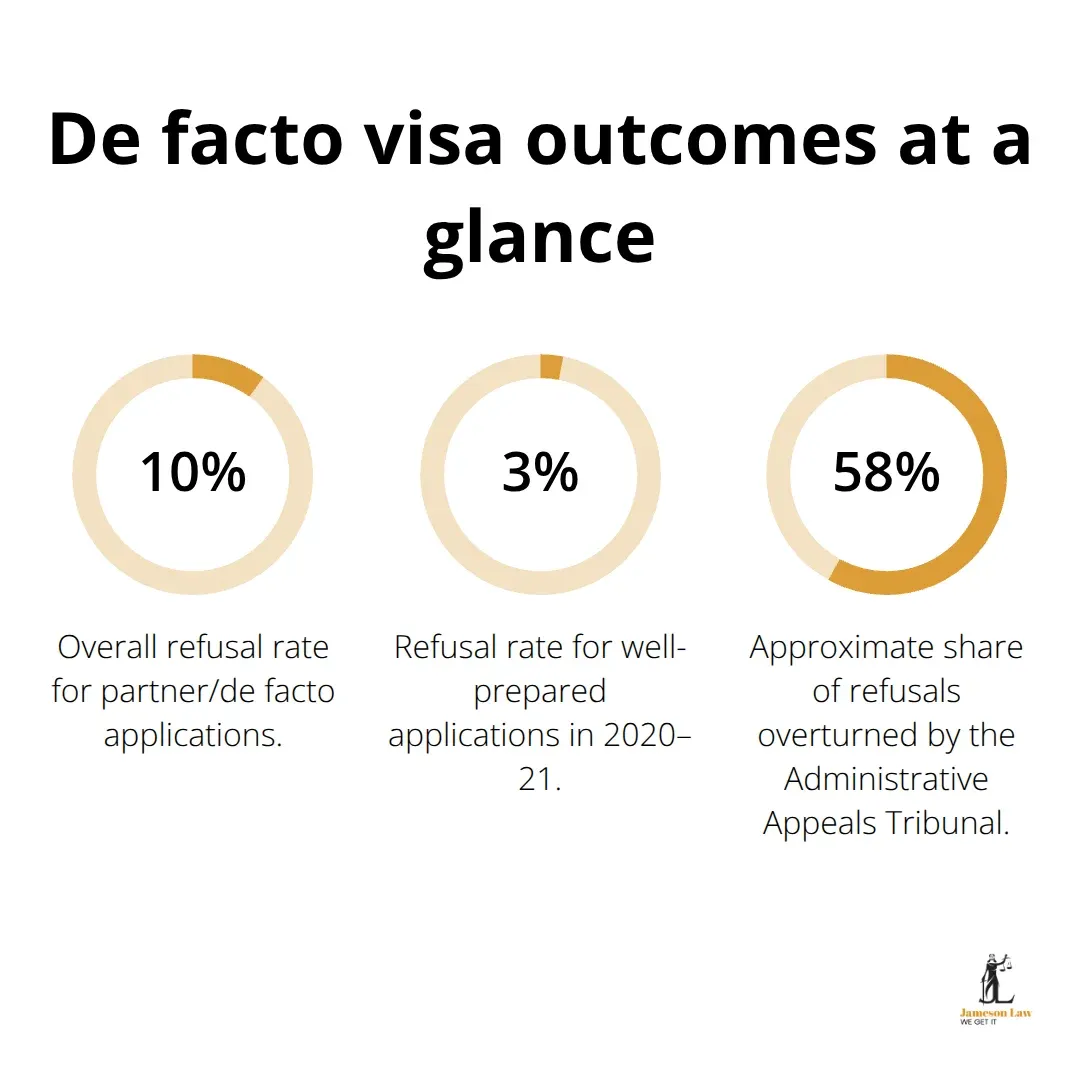Australia’s de facto visa requirements can feel overwhelming for couples navigating the immigration process. The documentation standards are strict, and one missing piece of evidence can delay your application for months.
We at Jameson Law see couples struggle with proving their genuine relationship every day. This guide breaks down exactly what immigration officers look for and how to build a bulletproof application.
Which De Facto Visa Category Fits Your Situation
Partner Visa Subclass 820/801 for Established Relationships
The Partner Visa Subclass 820/801 pathway serves couples who already live together in Australia. This two-stage process begins with the temporary 820 visa, then moves to permanent residency through the 801 visa after two years. The Department of Home Affairs processed 72,300 partner visas in 2020-21, up from 39,799 the previous year to address backlogs.
Your relationship must exist for at least 12 months before you apply (unless you have children together or compelling circumstances exist). Processing times currently stretch 24-31 months for 75th to 90th percentile applications, with Afghan citizens waiting an average of 43.6 months compared to just 7.3 months for US citizens. The application fee sits at approximately $7,850, which makes thorough preparation essential to avoid costly refusals.

Prospective Marriage Visa Subclass 300 Alternative
The Prospective Marriage Visa Subclass 300 suits couples who plan to marry within nine months of arrival in Australia. Current processing times range 23-27 months, which represents a threefold increase over the past decade. This visa requires proof of genuine intention to marry and ongoing relationship commitment, but allows entry before you establish the 12-month cohabitation requirement.
Afghan citizens face 34.3-month average processing times for Subclass 300 visas versus 15.3 months for US citizens, which highlights significant processing disparities. The refusal rate hovers around 10% overall (dropping to 3% in 2020-21), but the Administrative Appeals Tribunal overturns approximately 58% of refusals.
Strategic Differences Between Marriage and De Facto Applications
Married couples typically present stronger applications because marriage certificates provide concrete legal recognition. De facto relationships require extensive evidence across four key areas: financial interdependence, household arrangements, social recognition, and commitment to shared life. Immigration officers scrutinise de facto applications more intensively and demand comprehensive documentation that spans the relationship’s entire duration.
Marriage-based applications face fewer evidentiary challenges but still require proof of genuine ongoing relationship. Both pathways demand identical health checks, character assessments, and relationship authenticity demonstrations, but de facto couples must work harder to establish their legal standing through alternative evidence.
The next step involves understanding exactly what evidence immigration officers expect to see when you prove your de facto relationship exists.
What Evidence Proves Your De Facto Relationship
Immigration officers examine four specific evidence categories to verify your de facto relationship authenticity. Financial interdependence carries the heaviest weight in decision-making, followed by household arrangements, social recognition, and commitment evidence. The Department of Home Affairs expects comprehensive documentation that spans your entire relationship timeline, with recent evidence weighted more heavily than historical proof.
Financial Interdependence Documentation
Joint bank accounts represent the strongest financial evidence, but officers accept alternative arrangements if couples maintain separate finances for practical reasons. Shared mortgage documents, rental agreements with both names, and joint loan applications demonstrate committed financial partnership. Include utility bills, insurance policies, and credit cards that show shared responsibility.
Tax returns that list your partner as a dependant or beneficiary strengthen your case significantly. Avoid presenting only recent financial arrangements – officers scrutinise patterns that show progressive financial integration over time. Money transfers between accounts, shared investment portfolios, and joint business ventures provide additional compelling evidence of genuine financial partnership.

Social Recognition and Community Evidence
Statutory declarations from Australian citizens, permanent residents, or eligible New Zealand citizens who personally know your relationship carry substantial weight with immigration officers. These declarations must detail specific observations about your relationship dynamics, shared activities, and living arrangements rather than generic statements of support.
Photographic evidence should span your relationship duration and show attendance at family gatherings, holidays, and significant life events together. Officers expect to see integration into each other’s social circles through friendship networks, workplace acknowledgements of your partner, and community involvement as a couple.
Household and Domestic Arrangements
Include evidence of shared household responsibilities through joint shopping receipts, shared vehicle registration, and emergency contact listings. Digital communication records, travel itineraries that show joint trips, and evidence of future planning together reinforce relationship genuineness claims.
Lease agreements, utility connections, and mail delivery to the same address establish cohabitation patterns. Officers look for evidence that both partners contribute to household management and share domestic responsibilities (rather than one person simply visiting the other’s residence).
However, even the strongest evidence package can face unexpected challenges that derail your application timeline.
What Derails De Facto Visa Applications
Relationship Evidence Gaps That Trigger Refusals
Most de facto visa refusals stem from inadequate evidence presentation rather than genuine relationship issues. The Department of Home Affairs expects evidence across all four relationship categories, yet many refused applications fail to provide comprehensive financial interdependence documentation.
Officers question relationship authenticity when couples maintain completely separate finances without reasonable explanation. Immigration officers specifically look for progressive financial integration over time – sudden joint accounts opened weeks before application submission raise immediate red flags.
Couples who live together but split expenses equally without shared accounts must provide alternative evidence like shared utility bills, joint purchases, or documented financial support patterns. The Administrative Appeals Tribunal overturns 55% of partner visa refusals, which indicates that many initial refusals result from presentation issues rather than relationship legitimacy problems.
Health Checks and Character Requirements That Cause Delays
Health examinations must occur within 12 months of application lodgement and cover all applicants plus dependant family members. The medical examination process adds 4-8 weeks to standard timeframes, but undisclosed health conditions can extend delays significantly.
Character requirements demand police checks from every country where you lived for 12 months or more (including childhood residences). Missing police certificates from any relevant country will pause your application indefinitely.
Previous visa refusals, criminal convictions, or immigration violations require detailed explanations and supporting documentation that demonstrate rehabilitation or exceptional circumstances. Character waivers exist but demand compelling evidence that your relationship and community contributions outweigh past issues.
Processing Disparities That Extend Wait Times
Processing delays intensify when officers request additional character evidence, often adding 6-12 months to standard timeframes. Afghan citizens currently face extended processing times compared to other nationalities, which highlights how country-specific factors influence assessment speed.
The Department processes applications from certain countries faster than others, creating significant disparities in family reunion timelines. These processing differences affect couples’ ability to plan their future together and can create substantial emotional and financial strain during extended separation periods.
Final Thoughts
De facto visa Australia requirements demand meticulous preparation across four evidence categories: financial interdependence, household arrangements, social recognition, and commitment proof. The Department of Home Affairs processes applications with increased scrutiny, which makes comprehensive documentation your strongest defence against refusal. Start to gather evidence immediately and focus on joint financial arrangements that show progressive relationship integration over time.
Organise documents chronologically and address any character or health issues before submission. Processing times currently stretch 24-31 months, with significant variations based on nationality and case complexity. The 10% refusal rate drops to 3% for well-prepared applications, but the Administrative Appeals Tribunal overturns 58% of refusals (which highlights how proper preparation transforms weak applications into successful outcomes).

Complex immigration histories, character concerns, or insufficient evidence require professional assistance. We at Jameson Law help couples navigate the application process and address potential issues before they become problems. Professional guidance becomes essential when your future together depends on the right approach from the start.













